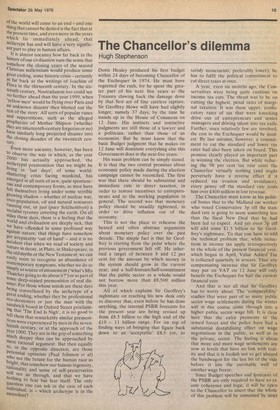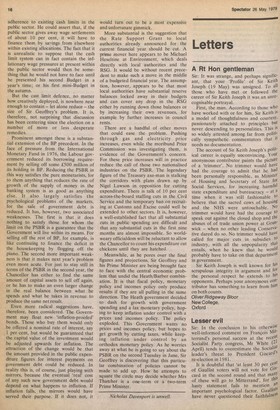The Chancellor's dilemma
Hugh Stephenson
Denis Healey produced his first budget within 24 days of becoming Chancellor of the Exchequer in 1974. He must have regretted the rush, for he spent the greater part of his next five years at the Treasury clawing back the damage done by that first act of fine careless rapture. Sir Geoffrey Howe will have had slightly longer, namely 37 days, by the time he stands up in the House of Commons on 12 June. His instincts and instinctive judgments are still those of a lawyer and a politician, rather than those of an economist. But he must know that the basic Budget judgment that he makes on 12 June will dominate everything else this Government does in the next five years.
His main problem can be simply stated. It is that the two central promises about economic policy made during the election campaign cannot be reconciled. The first was that there should be substantial and immediate cuts in direct taxation, in order to restore incentives to entreprenneurs and to the working population in general. The second was that monetary policy should be steadily tightened, in order to drive inflation out of the economy.
This is not the place to rehearse the heated and often abstruse arguments about monetary policy over the past decade. The simple fact is that Sir Geoffrey is starting from the point where the previous government left off. He inher ited a target of between 8 and 12 per cent for the amount by which money in the system should grow in the current year; and a half-forecast/half-commitment that the public sector as a whole would not borrow more than £8,500 million this year.
All of which explains Sir Geoffrey's nightmare on reaching his new desk only to discover that, even before he has done anything, the internal PSBR forecasts for the present year are being revised up from £8.5 billion to the high end of the £10 — 11 billion range. For on top of finding ways of bringing that figure back down to an 'acceptable' £8.5 (or, to satisfy monetarists, preferably lower), he has to fulfil the political commitment to cut direct taxes at once.
A year, even six months ago, the Conservatives were being quite cautious on income tax cuts. The thrust was to be on cutting the highest, penal rates of marginal taxation. It was these upper, confiscatory rates of tax that were knocking drive out of entrepreneurs and senior managers and driving talent into tax exile. Further, since relatively few are involved, the cost to the Exchequer would be modest. By last autumn, however, a commitment to cut the standard and lower tax rates had also been taken on board. This promise clearly played an important part in winning the election. But while reducing the 98 per cent tax rate costs the Chancellor virtually nothing (and might perversely have a reverse effect if it reduced tax evasion and avoidance), every penny off the standard rate costs him over £400 million in lost revenue.
The Chancellor must know in his political bones that to the Midland car worker who voted Conservative 3p off the standard rate is going to seem something less than the fiscal New Deal that he had been led to expect. And yet even 3p off will add some £1.5 billion to Sir Geoffrey's nightmare. To that you have to add the technical problem that, while reductions in income tax apply retrospectively to the whole of the present financial year, which began in April, Value Added Tax is collected quarterly in arrears. Thus any compensating increase that Sir Geoffrey may put on VAT on 12 June will only benefit the Exchequer for half the current financial year.
And that is not all that Sir Geoffrey has to worry about. The 'comparability' studies that were part of so many public sector wage settlements during the winter will in due course come through into a higher public sector wage bill. It is clear here that the extra payments to the armed forces and the police have had a substantial destabilising effect on wage negotiations in the public, as well as in the private, sector. The feeling is about that more and more wage settlements are now at levels that have no link with real ity and that it is foolish not to get aboard the bandwagon for the last bit of the ride before it hits the inevitable wall of another wage freeze.
Since Budget speeches and corecasts of the PSBR are only required to have an ex ante coherence and logic, it will be open to the Chancellor to assert that the whole of this problem will be contained by strict adherence to existing cash limits in the public sector. He could assert that, if the public sector gives away wage settlements of about 10 per cent, it will have to finance them by swings from elsewhere within existing allocations. The fact that it is unrealistic to suppose that the cash limit system can in fact contain the inflationary wage pressures at present within the public sector would then be something that he would not have to face until he presented his second Budget in a year's time; or his first mini-Budget in the autumn.
But the cast limit defence, no matter how creatively deployed, is nowhere near enough to contain — let alone reduce — the size of Sir Geoffrey's problem. It is, therefore, not surprising that discussion has been centering since the election on a number of more or less desperate remedies.
Prominent amongst these is a substantial extension of the BP precedent. In the face of pressure from the International Monetary Fund in 1976, the Labour government reduced its borrowing requirement by selling off some £500 million of its holding in BP. Reducing the PSBR in this way satisfies the pure monetarists, for to them anything that reduces the rate of growth of the supply of money in the banking system is as good as anything else. It also largely satisfies the psychological problems of the markets, for the sale of government debt is reduced. It has, however, two associated weaknesses. The first is that it does nothing to satisfy those for whom the limit on the PSBR is a guarantee that the Government will live within its means. For selling off the rest of BP, for example, is like continuing to finance the deficit in the housekeeping by flogging off the piano. The second more important weakness is that it makes next year's problem even more acute. For just to stay still in terms of the PSBR in the second year, the Chancellor has either to find the same amount of capital assets to sell off again, or he has to make an even larger change in the real balance between what he spends and what he takes in revenue to produce the same net result.
Even more radical suggestions have, therefore, been considered. The Government may float new Inflation-proofed' bonds. Those who buy them would only be offered a nominal rate of interest, say I per cent, but would be guaranteed that the capital value of the investment would be adjusted upwards for inflation. The attraction of the change would be that the amount provided in the public expenditure figures for interest payments on government debt could be reduced. In reality this is, of course, just playing with mirrors, because the eventual 'real' cost of any such new government debt would depend on what happens to inflation. If inflation falls, the mirrors would have served their purpose. If it does not, it would turn out to be a most expensive and unfortunate gimmick.
More substantial is the suggestion that the Rate Support Grant to local authorities already announced for the current financial year should be cut. A prime mover here appears to be Michael Heseltine at Environment, which deals directly with local authorities and the RSG. It would be without recent precedent to make such a move in the middle of a budgeted financial year. The assumption, however, appears to be that most local authorities have substantial reserve balances locked away in their budgets and can cover any drop in the RSG either by running down those balances or by increasing their own revenues, for example by further increases in council rents.
There are a handful of other moves that could ease the problem. Pushing through gas and electricity price increases, even while the moribund Price Commission was investigating them, is evidence of the Government's concern. For these price increases will in practice reduce the call of those two nationalised industries on the PSBR. The legendary figure of the Treasury axe-man is stalking the corridors with plans drawn up by Nigel Lawson in opposition for cutting expenditure. There is talk of 10 per cent across-the-board staffing cuts in the Civil Service and the temporary ban on recruiting at Customs and Excise could well be extended to other sectors. It is, however, a well-established fact that all substantial cuts in public spending are difficult and that any substantial cuts in the first nine months are almost impossible. So worldweary officialdom will be reluctant to allow the Chancellor to count his expenditure cut chickens until they are hatched.
Meanwhile, as he pores over the final figures and projections, Sir Geoffrey and his Prime Minister are being brought face to face with the central economic problem that undid the Heath/Barber combination. It is that fiscal policy, monetary policy and incomes policy only produce results if they are all pulling in the same direction. The Heath government decided to dash for growth with government spending and a lax monetary policy, hoping to keep inflation under control with a prices and incomes policy. The policy exploded. This Government wants no prices and incomes policy, but hopes to get growth by cutting taxes, while keeping inflation under control by an orthodox monetary policy. As he worries away at what he is going to say about the PSBR on the second Tuesday in June, Sir Geoffrey is discovering that this particular combination of policies cannot be made to add up. How he attempts to square the circle may decide whether Mrs Thatcher is a one-term or a two-term Prime Minister.
Nicholas Davenport is unwell.



































 Previous page
Previous page